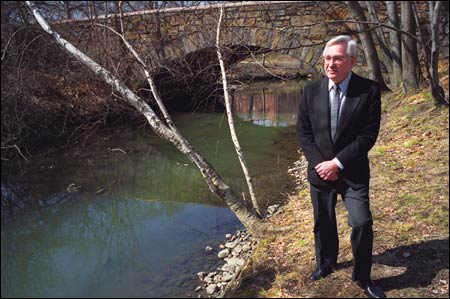Herbert Benson counsels busy students:
Take time to breathe

Stressed out? Exhausted? Scared? Confused? Eating poorly?
Harvard cares.
That’s the message the University is sending to undergraduates, graduate students, faculty, and staff by promoting its mental health resources with workshops and events during the two-week series Caring for the Harvard Community, which closes tomorrow (March 5). Organized under the broad theme of “A World of Well-Being: Focus on Emotional and Behavioral Health in a Community of Many Cultures,” this year’s Caring events are bringing the University’s faculty and mental health experts into undergraduate dorms and Houses, graduate student gathering places, and the workplace to share their knowledge in accessible, comfortable settings.
Organizers of Caring for the Harvard Community, sponsored by the Office of the Provost, say that response to the workshops, while positive, points to their necessity.
“People e-mailed me to say they couldn’t come because they had a cappella rehearsal or a volleyball game,” said Keli Ballinger, manager of the Center for Wellness and Health Communication, who collects R.S.V.P.s for Caring events. “Or they said, ‘Can I stop by for 10 minutes?’”
And at Mather House Monday (March 1), several students multitasked, glancing at reading assignments even as relaxation expert Herbert Benson shared techniques for quieting the clamor of their busy lives.
Benson, associate professor at Harvard Medical School and founding president of the Mind/Body Medical Institute, discussed the research and practice of his well-known “Relaxation Response,” a daily meditative practice that promises physiological as well as psychological well-being. Guiding the intimate gathering through a brief session of relaxation, he gained converts among the tightly scheduled students for whom a 10- or 20-minute daily commitment seemed a worthy trade-off for better concentration and lower stress.
Relaxation ’round the world
Trained as a cardiologist, Benson described the research that led to his 1975 book “The Relaxation Response” and his career in exploring the mind/body connection in health care. Between 60 and 90 percent of all physician visits are for stress-related complaints, he said, noting that cardiac disorders, hypertension, anxiety, depression, chronic pain, sexual and fertility problems, and diabetes all are exacerbated by stress.
Launching his inquiry in the 1960s when “stress wasn’t even on the horizon,” he said, he encountered practitioners of Transcendental Meditation (TM) who claimed they could lower their blood pressure with daily meditative practice. Despite skepticism within the medical community, Benson studied these practitioners, extensively monitoring their body functioning.
“I noted profound physiological changes by the simple act of their changing their thinking,” he said. Their breathing slowed by 25 percent, oxygen consumption decreased by 17 percent, their blood pressure dropped, and heart rates slowed. Benson distilled TM into its main components, which he identified as repeating a word, sound, prayer, phrase, or motion; and disregarding other thoughts to return to that repetitive element.
It’s a practice, he found, that’s rooted in most of the world’s cultures, often linked to religious applications. From the Upanishads to early Christian hermits to modern prayer recitation or secular applications like yoga, tai chi, or even addiction recovery programs, the concept of breaking the train of everyday thought to gain a sense of calm is a worldwide phenomenon, said Benson.
“This is nothing new,” he said. “All we have done is put this in the language of our day, which is science.”
Breathing is believing
Today’s Harvard students likely need this relaxation far more than Benson’s TM subjects of three decades ago. Describing stress as “any situation that requires you to change,” Benson noted that the increasing pace of life and information brought on by innovations like 24-hour news channels or instant messaging has only exacerbated our “fight or flight” response to stress.
“The world we are living in today is so astounding that we don’t know how to adjust to it, and that’s a stress,” he said, his soft-spoken singsong underscoring his call for more relaxation.
It wasn’t until Benson led the Mather House group through a brief relaxation exercise, however, that his message penetrated the clutter of the busy students’ lives. After alerting participants to potential side effects – “if you think prayer is dangerous, then this is dangerous,” he said – Benson had the students and others sit comfortably, close their eyes, and listen to their breathing.
Pick a word or phrase, he instructed, that resonates with you. He offered secular examples like “one,” “peace,” and “love,” and religious phrases such as “The Lord is my shepherd” or “Shalom.” He then asked participants to silently repeat their chosen words or phrases with each exhale. When stray thoughts enter, which they will, he said, gently push them away and return to the repetition. After several minutes, he ended the session by encouraging participants to let their everyday thoughts return, then slowly to open their eyes.
Participants reported feeling an enhanced sense of well-being, slower breathing, a relaxation of facial muscles, and even an increase in skin temperature (the body redistributes blood flow, Benson explained). Had they gone to class or tackled a study session, Benson said they’d experience something different, too.
“Right now, your minds are more open. There’s less static, there’s less noise,” he said. “You will find that your efficiency and performance will be improved.”
For optimal results, Benson told the curious students, practice this relaxation each morning for ten to twenty minutes. “It is not a substitute for sleep,” he cautioned the ever-sleep-deprived college students, but should bring results that last far beyond the brief investment of time.
Over cookies and casual conversation following his talk, Benson, Ballinger, and Caring for the Harvard Community coordinator Sharon Thomas drove home the series’ message: Resources like Benson and courses using his Relaxation Response are accessible to everyone at Harvard, and students could improve their performance and their health by taking advantage of them.
“You people are so busy that you’re actually turning your backs on what you need most,” said Benson.




